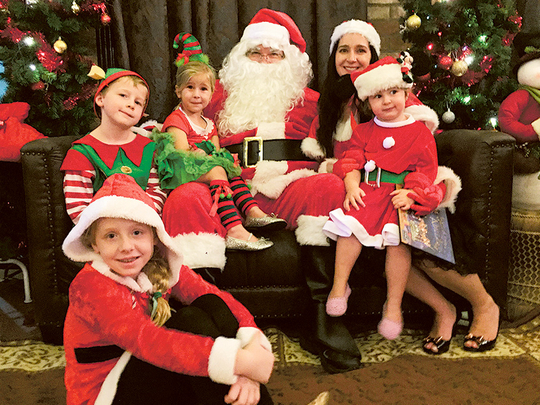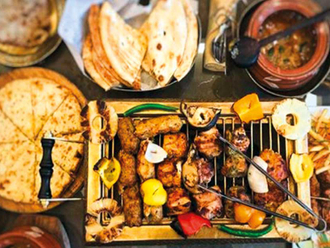
Abu Dhabi: One of the enduring aspects of celebrating Christmas, for children particularly, is the joy of anticipating gifts from Santa Claus. The much-cherished tradition of children writing to Santa of their dreams and of Santa visiting them bearing gifts has ignited many a child’s imagination. Yet come the end of the year, the long-standing debate prompted by psychological experts rears its head — should children be fed myths only for them to realise later on that what they had so fervently believed in is actually non-existent?
Gulf News spoke to parents to know where they stand in this debate.
The Abu-Dhabi based Youlten family from Australia are big believers in Christmas and its traditions.
“Christmas is a time for giving and sharing with family and loved ones and my kids get very excited about Santa Claus and believe that Santa is a humble, nice, and caring man who wants to spread joy among people,” said Simona Youlten, mother of five children and a cafe owner.
“The children write letters to Santa, not just asking for presents, but explaining [to Santa] how they behaved throughout the year, helped each other, and performed at school,” she said.
Youlten believes that the extra stress on parents and children to debunk the myth of Santa is unnecessary. “Children are innocent and pure and should remain that way, and I don’t believe that we are fooling our kids about Santa,” she said.
“[When we were kids], our parents did the same thing [to us]. There is no harm in telling children that Santa will bring them gifts. Santa’s character has progressed and [even] we get as excited as our children about Santa,” Simona added.
Charlotte Youlten, 25, recollects her Christmases. “As a little girl, my family celebrated Christmas barbecuing by the beach in Australia. My relatives and cousins would get together at my grandparents’ house waiting eagerly for Santa to arrive with presents, but we were not allowed to see him; so, our parents would tell us to write letters with the gifts we wanted from Santa.
“In the morning, we would wake up and find presents under the Christmas tree and my grandfather would tell us that Santa nominated him to give out our presents,” Charlotte said.
“As I grew older, I knew it was a myth, [but] my feelings about Santa haven’t changed. In fact, I was even more intrigued and thought of being Santa Claus myself.”
She added, “Today, I have five younger siblings and I want them to get the opportunity we had as little kids to explore that magical feeling about Santa Claus; and use their imagination.”
The Salama family from Egypt too are keen on passing on the legend of Santa to younger family members.
Hana Salama, 30, human rights consultant and mother of one child, recollects her memories of Santa as a little girl.
“I remember my sister Sara and I would write letters to Santa asking for presents. Next morning, we would find presents under the Christmas tree, and our parents would tell us that Santa came at night through the chimney and left them for us,” Salama said.
“Today, [my husband] Marc and I want our one-and-half-year-old son, Jonnah, to experience the joy and spirit of Christmas, just like we did. I want my son to experience the joy of Christmas and believe in Santa, as it makes him very happy.”
Hala Samir, mother of two girls and also a grandmother, believes that children should enjoy the special moments of Christmas, especially when it comes to Santa Claus.
“I remember my father would take my siblings and I to the recreation club in Khartoum to meet Santa Claus, who would give out presents to all the children in the club. [Even when we grew up] and came to know of the truth, we still had the special feeling about him,” Samir said.
Samir has passed on the Santa Claus Christmas tradition to her children. “My daughters Hana and Sara were brought up in Montreal. I would take them to a popular park in the city, where Santa would land in his helicopter and give out gifts.”
Samir believes that despite Santa Claus being a myth, children should be encouraged to explore Christmas traditions. “I don’t believe that we are lying to our children or tricking them. Eventually, the kids grow up and learn of the truth, but they still cherish Santa.”
Indian resident Debbie Baptista, a mother of two, said she let her children believe in the fantasy of Santa Clause when they were young, and watched them grow out of it naturally. “My kids are a lot older now, but when they were younger, I would tell them that Santa won’t be delivering their gifts if they did not listen to me — that didn’t last too long as my eldest son would tell his sister the gifts came from mum and dad,” she said.
She believed in letting them both sides of the coin — believe in the fantasy of Santa Claus and discovering that he is a fictional character on their own.
For Jonathan Howell-Jones, a British expatriate, there are rich and varied traditions represented in Father Christmas. “His origin lies in being a Turkish bishop who gave out of kindness without expectation of reward, the spirit of winter, the representation of rebirth and renewal amidst the winter solstice. Yet he endures as a spirit of giving and kindness who makes children happy,” said Howell-Jones.
The Dubai resident said he still believes in Father Christmas, and considers Christmas a time of peace, love and giving to make a better kinder world — a teaching he has passed on to his daughter. “We could all do with knowing that there is a spirit of giving without expecting receipt of reward in turn,” said Howell-Jones.








